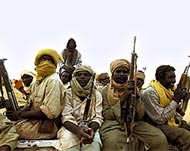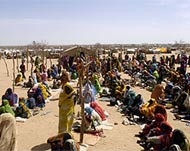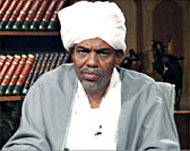Sudan hits back on Darfur charges
Sudanese officials and an alleged militia leader have poured scorn on international claims about the conflict in western Darfur.

They told Aljazeera that Darfurian rebels, who are widely perceived to be the victims of the conflict, had to share the blame for the crisis.
And they say the international media is wrongly portraying events in Darfur as a racial war, when it is really a dispute over land.
The comments come as the Sudanese government is bearing the brunt of world condemnation for the crisis in its western province.
Powerful western nations, as well as the United Nations, human rights groups and Darfurian rebels, say Khartoum is directly responsible for the killing of more than 50,000 people and the displacement of more than a million others.
They accuse the government of training and arming a militia, known as the Janjawid, to wipe out opposition to its rule in the province.
UN resolution
The situation is so acute that the UN Security Council has given Khartoum a month to disarm the Janjawid or face punishment.
A UN resolution last Friday also required Khartoum to facilitate free access for humanitarian groups and to allow about 1.2 million displaced people and 150,000 refugees in neighbouring Chad to return home.
|
“Janjawid means nothing, but it is a word used to encompass all evil. A convenient way for Americans to understand who are the good guys and who are the bad – it is easier to sell policies that way” Musa Hilal, |
Western nations have further raised the possibility of military intervention to protect the Darfurians.
But Sudan has reacted with indignation to the accusations.
Khartoum, which has called the Janjawid “bandits”, says the Darfur rebels are prolonging the conflict to force a foreign intervention.
It says Washington is using the crisis to try to topple its government, and that any military intervention may lead to the disintegration of the country.
Darfur marginalisation
The Darfur conflict erupted in February 2003 when two rebel groups – the Sudan Liberation Army/Movement (SLA/M) and the Justice and Equality Movement (JEM) – demanded an end to alleged economic marginalisation and sought power-sharing within the Sudanese state.
The movements, which are drawn from members of the Fur, Masalit, and Zaghawa tribes, also sought government action to end alleged abuses by their rivals – pastoralists who are driven on to farmlands by drought and desertification.
 |
|
Darfurian rebels are themselves |
But an Arab tribal chief, who Washington accuses of being the most senior Janjawid leader, told Aljazeera.net his tribe was only defending itself.
Musa Hilal, speaking from house arrest in Khartoum, said: “When the rebellion began last year, the government approached us and armed us. My sons were armed by the government and joined the Border Intelligence.
“Some tribesmen joined the Popular Defence Force. I called my tribe to arms as well. We were caught up in an uprising the rebels began – what should I have done?”
He added: “We had camels stolen and young men murdered – banditry performed by the Zaghawa. When we retaliated, the Zaghawa joined with the Fur. When the tribes retaliated, they called in the world community. Now Zaghawa support the rebels – they are enemies.”
‘Janjawid’ denials
Hilal, who denies his tribe has committed any atrocities, says his force will disarm when the Darfurian rebels respect a ceasefire.
He added: “Rebels constantly talk to human rights groups and aid workers as if the Janjawid were some kind of organised army. There is no political or military common policy for the tribes that are fighting rebels for their very existence. They started this war.
|
“I believe that all sides are involved [in attacking civilians] – the so-called Janjawid militias, organised militias, too many unemployed men with too many guns, government forces and definitely also rebel forces” Jan Egeland, |
“Janjawid means nothing, but it is a word used to encompass all evil. A convenient way for Americans to understand who are the good guys and who are the bad – it is easier to sell policies that way.”
A Sudanese official, who refused to be named, told Aljazeera the Darfur crisis was being turned into a race issue by much of the media, which portrayed it as “Arab tribes” attacking “black Africans”.
But the official says the tribes, which are all Muslim, are of mixed ethnic stock and the conflict is a land issue between nomads and subsistence farmers in the region.
Jan Egeland, the UN Emergency Relief Coordinator, has also said the war is more complex than is generally reported.
Ethnic cleansing?
In an interview with the United Nations Office for the Coordination of Humanitarian Affairs, he said: “There are many armed groups and many criminal gangs in Darfur…
“I believe that all sides are involved [in attacking civilians] -the so-called Janjawid militias, organised militias, too many unemployed men with too many guns, government forces and definitely also rebel forces.”
 |
|
Darfur’s tribes are of mixed |
He added: “It’s complex because some have said it doesn’t fit the legal definition of ethnic cleansing. The same tribes are represented both among those who are cleansed and those who are cleansing.”
Nevertheless, human rights groups say the Sudanese government is responsible for “ethnic cleansing” and crimes against humanity in Darfur.
In a report in May, New York-based Human Rights Watch (HRW) said Khartoum and the Janjawid militias “it arms and supports” had committed numerous attacks on civilians among the Fur, Masalit and Zaghawa tribes.
HRW said government forces oversaw and directly participated in massacres, summary executions of civilians, burnings of towns and villages, and the forcible depopulation of wide swathes of land.
Rebel pleas
It said the government and “its Janjawid allies” killed thousands of Fur, Masalit, and Zaghawa, raped women, and destroyed villages, food stocks and other supplies essential to the civilian population.
The militias have also driven more than one million civilians, mostly farmers, into camps and settlements in Darfur where they live on the very edge of survival, the report said.
|
“The Janjawid are a government institution like the interior and foreign ministries, mainly designated for [ethnic] cleansing, genocide, rape and subduing under the direct auspices of the vice president’s office” Mahjub Husayn, |
In response to the crisis, the Darfur rebel movements have called for rapid international action.
They have demanded that Khartoum should disarm the Janjawid, bring those who allegedly committed crimes to justice, allow unimpeded humanitarian access to the region, and free prisoners of war.
Mahjub Husayn, external liaison officer for the Sudan Liberation Movement, told Aljazeera the rebels only sought to globalise the crisis because of the “overwhelming crimes perpetrated against the Darfur people”.
“We view all the measures taken by the Sudanese regime as superficial and characterised with procrastination and deception,” he said.
‘Genuine grievances’
“The Janjawid are a government institution like the interior and foreign ministries, mainly designated for [ethnic] cleansing, genocide, rape and subduing under the direct auspices of the vice president’s office.”
He added: “We call for the liberation of Sudan from the current attitude of… marginalising [Darfur], from injustice, from servitude, from slavery and from all the culture that has no respect for human rights.”
 |
|
Umar al-Bashir says Washington |
Meanwhile, the Sudanese government, which has pledged to disarm the Janjawid, acknowledges the rebels in Darfur have genuine grievances.
Hasan Abd Allah Bargu, a Sudan government representative and a negotiator with the Darfur rebel movements, told Aljazeera: “Darfur is underdeveloped like other regions of Sudan… but we don’t agree on using armed struggle to resolve this matter.”
He added: “The issue of economic development has been exploited by some political parties.”
Other Sudanese officials, such as Khartoum’s envoy to the African Union (AU), have accused Washington of using the Darfur crisis as a pretext to topple the Sudanese government, which Washington has long opposed.
Foreign intervention
Usman al-Said, Sudan’s ambassador to the AU, told reporters last week that western military intervention in its remote western region would risk splitting Africa’s largest country and unsettling its neighbours.
“The Americans are targeting the government of Sudan because of its political stance,” he said, pointing to Sudan’s policies on prominent Arab issues such as Iraq and the Israel/Palestinian dispute.
|
“As for the US… Bush wants to see a quick end to this problem. He wants to list Sudan as one of his achievements in this election year” Mustafa Usman Ismail, |
Moreover, Sudanese President Umar al-Bashir has said the international community is ignoring reports about ceasefire violations by Darfur rebels.
He has argued the rebels were the ones who walked out on peace talks and should be held responsible for exploiting the situation to make political gains.
Sudan’s Hasan Abd Allah Bargu told Aljazeera: “The rebel groups are presently disinterested in conforming with the current arrangements, thus paving the way for foreign intervention. This will breed a new crisis for the government.”
Sudanese Foreign Minister Mustafa Usman Ismail has also questioned the need for foreign troops in Darfur, saying his government is doing all it can to disarm militias.
“Why should we have to rush and to talk about military intervention as long as the situation is getting better?” he said last week. “My government is doing what can be done in order to disarm the militia.”
He added: “As for the US… Bush wants to see a quick end to this problem. He wants to list Sudan as one of his achievements in this election year.”